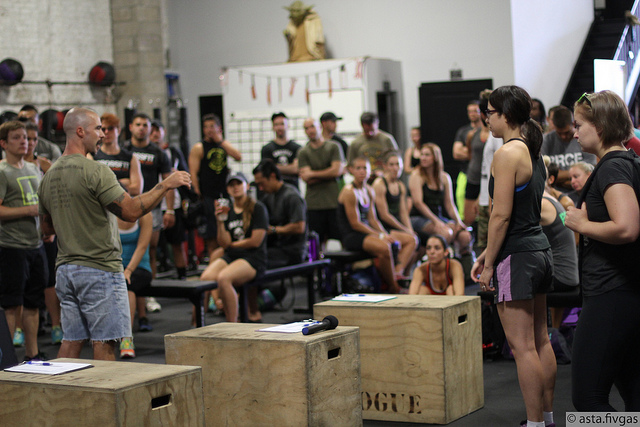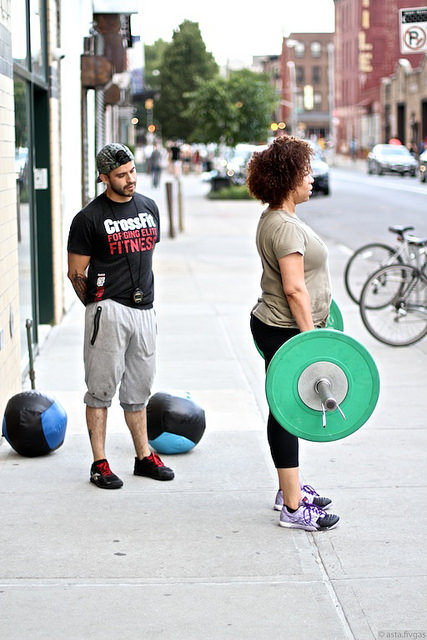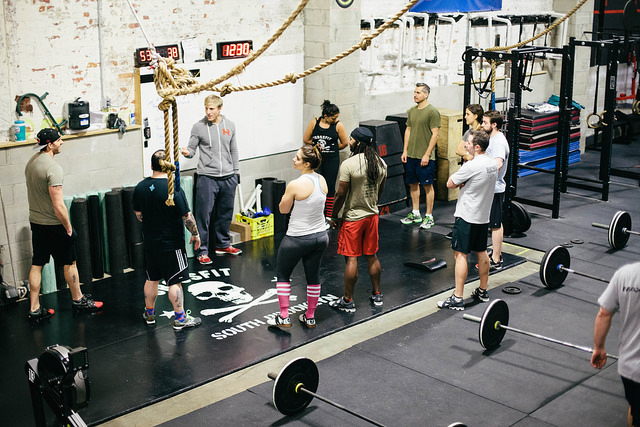CFSBK Zoom Room (Password: CFSBK)
Active Recovery: 10am
Today’s Programming
METCON
4 Intervals of:
Row 250m
5 Strict Pull-Ups
10 Burpees
15 Kettlebell Swings
-Rest 3:00-
Notes
Go HARD on each interval. Burpees should be a sprint and the Kettlebell should be heavy and unbroken
ASSISTANCE
3 Sets:
1:00e Single Arm Farmers Hold
10-12 Shoulder External Rotation + Prone Press out
CrossFit Group Class Programming Template

Cheryl getting her ab pump on with some weighted Sit-Ups
5 Things I Know to Be True About Running a CrossFit Gym
 Tuesday, July 29, 2014 on Inside The Affiliate
Tuesday, July 29, 2014 on Inside The Affiliate
As we’ve mentioned on Inside the Affiliate before, coaching skill is only a small part of what it takes to run an affiliate, and there are countless other qualities that are required to excel in this business. For starters: the ability to manage people, make tough or sometimes unpopular decisions, listen to your instincts, and the humility to know that you won’t always be right. Two weeks ago, we talked about how to start a great gym. This week, I’m sharing 5 things I’ve learned since starting CrossFit South Brooklyn and growing it into a thriving affiliate.
1. You must be good with people.
If you’re not comfortable working with a variety of personalities, this might not be the profession for you. As any seasoned coach or trainer knows, a huge part of this business requires the social fluency to deal with a vast spectrum of people on a daily basis. This skill becomes even more critical when running an affiliate, as your reactions and responses to different situations carry greater weight and begin to represent the ethos of the business itself. If people easily get under your skin, I recommend treading lightly—how you interact with members, coaches, or partners can easily turn a potential success into a frustrating mess. 
2. Your business will profit from organic growth,
If you know anything about evolution in nature, you know that small mutations in DNA lead to extremely adapted creatures with less chance of extinction—and these mutations happen organically, often leading to unexpected results. If you let it, your business can also grow in organic ways that stretch beyond what you could have imagined, and for the better.
To that end, realize it’s okay to let go of some control and allow things to happen organically within your community of coaches and members. I often hear people complain that business owners in many fields, not just fitness, try to micromanage everything and don’t trust people enough to let them explore new ways of doing things—even if those news ways mean possibly making mistakes. This kind of rigidity stifles an important creative element that is necessary to grow a business (and I think it is one of the reasons many gyms have high turnover rates with their coaching staff). Your affiliate will become larger than you or your original vision, for the better, so embrace the process of organic growth.
3. Learn what’s most important when it comes to hiring great coaches.
When I first moved to New York City, I had the good fortune of being hired by an insightful coach who taught me that for the most part, any dedicated, intelligent person could learn the skills required to become an exceptional coach. Learning how to identify and triage movement faults, effective cueing, and the nuts and bolts of programming and kinesiology can be both taught and learned. Shitty personality traits, however, are much harder to modify in adults and often fall well beyond the scope of any affiliate owner who is looking to train or mold a coach.

So, hire based on personality first, then potential. Make sure that the people you hire have the people-person qualities we outlined in Number 1—namely, the maturity to be professional and work well with a variety of personalities. We are in the service industry, and the success and reputation of your gym depends on having a staff that honestly cares about the people they’re working with. Individuals who are condescending, impatient, and create drama in your gym are to be avoided at all costs, in my opinion. These people can corrode and undermine the culture you’ve created by placing their own interests and biases above the greater common goal of helping run a great affiliate.
Until this week, all of CFSBK’s coaches have been hired from within our community after they first demonstrated an interest in learning the “hard skills” of becoming a coach and second, all the “soft skills” of personality I mentioned above. Hiring from within certainly isn’t the only way to do things, and we are pleased to have just hired our first coach from outside our community. Each day may not be a warm and fuzzy love fest at your gym, but curate your staff wisely and avoid countless headaches and major potential damage control down the line.
4. Learn to manage your time.
Be forewarned: running a business means there are lots of random things that come up that fall outside the purview of coaching and running classes, and those things only increase as your business grows. For example, dealing with health insurance reps and paperwork now requires a sizable amount of my time, since CFSBK became successful enough to offer health insurance to our full-time coaches. As best as you can, learn how to manage your time efficiently, so you have the capacity to deal with the unexpected stuff. Also, there are a lot of emails—like, way too many emails. Get good at dealing with these.
5. Don’t cut corners when it comes to the details, and be the person you’d want to hire.
In the early days of CFSBK, I did everything from the blog, to cleaning the floors and organizing the equipment on a daily basis. Know that there are going to be days when you start to lose sight of why this is important—but taking pride in all the little things helps you appreciate the entire spectrum of work that goes into running a tight ship.
One of the best ways to be an empathetic manager is to first become a dedicated employee in your own business. Especially in the future, when you’re not the one doing it all, you’ll be glad that you know what goes into executing each detail well. On the days when you’re tired and want to start cutting corners, remember that details matter and every little piece, even those that are less glamorous, is an important part of a much larger whole.
Fran Lebowitz’s One-Star Amazon Reviews The New Yorker